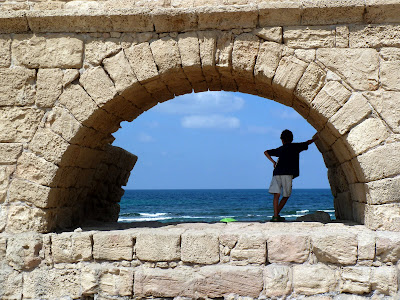It's a world-class archeological site! No, it's a luxury beach-club! Calm down you two, it's both!
Caesarea is a giant tourist playground less than an hour north of Tel Aviv. There's a lot of history here, but there's also a beautiful beach teeming with children, numerous seaside bars and restaurants, a large attractive lawn for playing and picnicking, plenty of rocky spots for scampering and climbing, and a spectacular 4,000-seat (and 2,000-year old) theater hosting summer concerts.
OK, let's start with the history. Thanks to our inside sources at Wikipedia, the Jewish Virtual Library, and the Israel Nature and Parks Authority, we've learned that Caesarea was established as a Phoenician trading city in the 4th century BCE. It was originally named "Straton's Tower" after its founder, Straton I, who ruled Sidon, one of the oldest and most important Phoenician cities, now in Lebanon.
Alexander Jannaeus, King of Judea, conquered Straton's Tower around 100 BCE, and it was briefly a Jewish city, until the Roman conquest in 63 BCE. Straton's Tower was awarded to Herod the Great, who rebuilt the city and renamed it "Caesarea," in honor of the Roman emperor, Caesar Augustus. Herod went to great lengths to prepare a magnificent planned city with a deep sea harbor, aqueduct, hippodrome, amphitheater, Roman temple and extensive road network. Caesarea took 12 years to rebuild and was described as the grandest city in Palestine at the time other than Jerusalem. It quickly became a major commercial center and regularly hosted major sporting competitions, gladiator games, and theatrical productions. In 6 CE, Caesarea became the headquarters of the Roman government in Palestine and it remained the Roman capital until the rule of Constantine in the 4th century CE.
Caesaria is an important site in both Jewish and Christian history. The Great Jewish Revolt, which culminated in the razing of Jerusalem and the destruction of the second temple, started in Caesaria in 66 CE. Caesaria was also the site where the Romans executed Rabbi Akiva, a shepherd who became one of Judiasm's greatest scholars, in 135 CE following the Bar Kokhba revolt, which culminated in the Romans banishing the Jews from Jerusalem. After both revolts, the Romans used Caesarea's amphitheater for mass executions of Jews.
Caesaria also was the place where Pontius Pilate governed during the time of Jesus; where Simon Peter converted the Roman Cornelius, the first non-Jew to believe in Jesus; and where Paul was imprisoned for two years. The city became a center of Christian learning in the 3rd century and remained so even after the Romans shifted the center of their eastern empire to Constantinople.
The city flourished during the Byzantine period, with a mixed population of Jews, Christians, Pagans, and Samaritans, and it became the largest fortified city in Palestine. But the massive fortifications could not prevent the Arab conquest of 640 CE, although the city was the last in Palestine to fall to the Muslim invaders. The city subsequently lost its political and economic importance and faded into a small village.
But the Crusaders then captured (then lost, then reconquered) the city, and King Louis IX of France rebuilt and refortified it in 1251. But alas, this proved to be a wasted effort, as the Mamluks conquered Caesarea only a few years later in 1265 - and in a familiar refrain you may already have read on this blog - pounded the city into a pile of rubble. (Apparently, the Mamluks pounded the entire coastline into a pile of rubble.)
The ruins of this once-great city were then swallowed over time by the sands - to be rediscovered more than 600 years later, starting in 1873 with an expedition by the Palestine Exploration Fund, a British organization founded under the royal patronage of Queen Victoria. Free from invading Romans, Crusaders and Mamluks, tourists can now enjoy the site by wondering aimlessly among the extensive ruins, eating sushi or schnitzel overlooking the sea, lazily reading a book under a tree (let's say something from the Harry Potter series), or hanging out at the trendy "Beach Bar" for a swim and a stiff drink while gazing out at the old city walls and the local fisherman.
Ah, it's a difficult life...
















I soooo wish we were there with you. This flip flopping is really bordering on absurd!
ReplyDelete